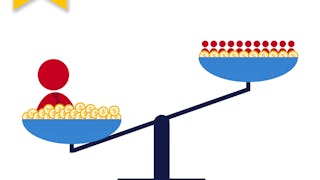Welcome to the Democratic Governance and Policymaking course! In this course, you will learn that all citizens collectively desire public goods such as justice, peace, and welfare, but beyond their individual means. A state is a politically organized society to fulfill citizens’ public good needs. Politics is an activity in pursuit of the collective interests of the citizens. Policymaking is a collective action to identify, adequately provide, and equitably allocate desired public goods. However, arriving at a collective choice on who gets what, when, and how much, and who decides and how, faces joint action problems. This often leads to a policy gap between citizens’ preferences and policy provision, resulting in a loss of well-being. Governance in policymaking is about providing stewardship to these collective efforts through institutional mechanisms to minimize the policy gap. Democracy in governance is about the active participation of citizens, directly or indirectly, at all stages of policymaking.



Empfohlene Erfahrung
Was Sie lernen werden
Explain the challenges in public good provision in a complex heterogeneous society using the policy gap framework.
Acquire insights on pathways linking citizen participation with effective policymaking and appreciate its limitations.
Develop the ability to engage in an informed way in discourses on governance issues.
Develop empirical approaches to measure democratic governance and its determinants.
Kompetenzen, die Sie erwerben
- Kategorie: Discussion Facilitation
- Kategorie: Economics
- Kategorie: Political Sciences
- Kategorie: Community Development
- Kategorie: Coordination
- Kategorie: Policy Analysis
- Kategorie: Governance
- Kategorie: Public Policies
- Kategorie: Social Sciences
- Kategorie: Public Administration
- Kategorie: Policy Development
- Kategorie: Sociology
Wichtige Details

Zu Ihrem LinkedIn-Profil hinzufügen
September 2025
29 Aufgaben
Erfahren Sie, wie Mitarbeiter führender Unternehmen gefragte Kompetenzen erwerben.

In diesem Kurs gibt es 7 Module
In this module, you will examine the evolution of society from a simple homogeneous unit to a complex heterogeneous state. The module also analyzes how heterogeneity can lead to multi-peaked preferences for the public good needs and the collective action problems in aggregating such preferences into a collective choice for policymaking.
Das ist alles enthalten
10 Videos3 Lektüren4 Aufgaben1 Plug-in
In this module, you will conceptualize governance as a social mechanism designed to provide stewardship to the collective action by the citizens. Lastly, it explains how institutionalizing the rules (of the game) and their enforcement enables collective action for public goods.
Das ist alles enthalten
10 Videos2 Lektüren4 Aufgaben
In this module, you will be introduced to deliberative participation and its guiding and regulatory principles. You will be able to understand how deliberative participation can enable collective action for collective choice in a policymaking context. The module provides an empirical framework that can be used to develop approaches to make participation more deliberative ex-ante and evaluate the deliberative quality of participation, ex-post.
Das ist alles enthalten
10 Videos2 Lektüren4 Aufgaben
In this module, you will gain an understanding of the need for representation in democratic governance through four questions, that is, represent what, represent whom, who can represent, and how should representation happen. The module concludes with a brief analysis of how the nature of representation can bear upon the effectiveness of public policy.
Das ist alles enthalten
8 Videos2 Lektüren4 Aufgaben
In this module, you will examine the rationale for multi-order democratic governance from different perspectives. You will be able to critically analyze the political economy challenges in policymaking in such a context, and how these challenges may influence policy effectiveness.
Das ist alles enthalten
8 Videos2 Lektüren4 Aufgaben
In this module, you will empirically test the supposition that democratic governance improves policy effectiveness by reducing policy gaps. Toward this, you will be intrigued to ask the research question: whether and how deliberative participation in policymaking institutions improves the provision of local public goods. Later you will find evidence in a throughput study of the local governments of India.
Das ist alles enthalten
8 Videos1 Lektüre5 Aufgaben
This module is motivated by the question: what explains the effectiveness of democratic governance? It starts with a critical analysis of popular composite measures of the quality of democratic governance. Following this, it seeks to find answers to the question, in two broad categories of determinants: Attributes of the community, and attributes of the citizens.
Das ist alles enthalten
8 Videos2 Lektüren4 Aufgaben
Auf einen Abschluss hinarbeiten
Dieses Kurs ist Teil des/der folgenden Studiengangs/Studiengänge, die von O.P. Jindal Global Universityangeboten werden. Wenn Sie zugelassen werden und sich immatrikulieren, können Ihre abgeschlossenen Kurse auf Ihren Studienabschluss angerechnet werden und Ihre Fortschritte können mit Ihnen übertragen werden.¹
Dozent

Mehr von Governance and Society entdecken
 Status: Kostenlos
Status: KostenlosUtrecht University
 Status: Vorschau
Status: VorschauUniversity of Copenhagen
 Status: Vorschau
Status: VorschauUniversity of North Texas
 Status: Vorschau
Status: VorschauUniversità di Napoli Federico II
Warum entscheiden sich Menschen für Coursera für ihre Karriere?





Neue Karrieremöglichkeiten mit Coursera Plus
Unbegrenzter Zugang zu 10,000+ Weltklasse-Kursen, praktischen Projekten und berufsqualifizierenden Zertifikatsprogrammen - alles in Ihrem Abonnement enthalten
Bringen Sie Ihre Karriere mit einem Online-Abschluss voran.
Erwerben Sie einen Abschluss von erstklassigen Universitäten – 100 % online
Schließen Sie sich mehr als 3.400 Unternehmen in aller Welt an, die sich für Coursera for Business entschieden haben.
Schulen Sie Ihre Mitarbeiter*innen, um sich in der digitalen Wirtschaft zu behaupten.
Häufig gestellte Fragen
To access the course materials, assignments and to earn a Certificate, you will need to purchase the Certificate experience when you enroll in a course. You can try a Free Trial instead, or apply for Financial Aid. The course may offer 'Full Course, No Certificate' instead. This option lets you see all course materials, submit required assessments, and get a final grade. This also means that you will not be able to purchase a Certificate experience.
When you purchase a Certificate you get access to all course materials, including graded assignments. Upon completing the course, your electronic Certificate will be added to your Accomplishments page - from there, you can print your Certificate or add it to your LinkedIn profile.
You will be eligible for a full refund until two weeks after your payment date, or (for courses that have just launched) until two weeks after the first session of the course begins, whichever is later. You cannot receive a refund once you’ve earned a Course Certificate, even if you complete the course within the two-week refund period. See our full refund policy.
Weitere Fragen
Finanzielle Unterstützung verfügbar,
 enthalten
enthalten
